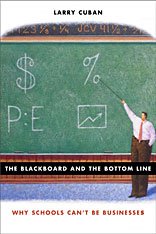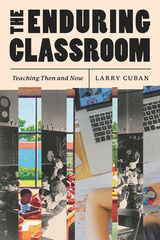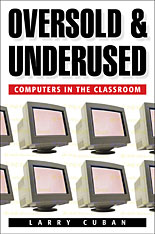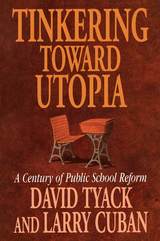
Take an economically and racially diverse urban school district emerging from a long history of segregation. Add an energetic, capable, bridge-building superintendent with ambitious district-wide goals to improve graduation rates, school attendance, and academic performance. Consider that he was well funded and strongly supported by city leaders, teachers, and parents, and ask how much changed in a decade of his tenure—and what remained unchanged?
Larry Cuban takes this richly detailed history of the Austin, Texas, school district, under Superintendent Pat Forgione, to ask the question that few politicians and school reformers want to touch. Given effective use of widely welcomed reforms, can school policies and practices put all children at the same academic level? Are class and ethnic differences in academic performance within the power of schools to change?
Cuban argues that the overall district has shown much improvement—better test scores, more high school graduates, and more qualified teachers. But the improvements are unevenly distributed. The elementary schools improved, as did the high schools located in affluent, well-educated, largely white neighborhoods. But the least improvement came where it was needed most: the predominantly poor, black, and Latino high schools. Before Forgione arrived, over 10 percent of district schools were failing, and after he left office, roughly the same percentage continued to fail. Austin’s signal successes amid failure hold answers to tough questions facing urban district leaders across the nation.

"Ford Motor Company would not have survived the competition had it not been for an emphasis on results. We must view education the same way," the U.S. Secretary of Education declared in 2003. But is he right? In this provocative new book, Larry Cuban takes aim at the alluring cliché that schools should be more businesslike, and shows that in its long history in business-minded America, no one has shown that a business model can be successfully applied to education.
In this straight-talking book, one of the most distinguished scholars in education charts the Gilded Age beginnings of the influential view that American schools should be organized to meet the needs of American businesses, and run according to principles of cost-efficiency, bottom-line thinking, and customer satisfaction.
Not only are schools by their nature not businesslike, Cuban argues, but the attempt to run them along business lines leads to dangerous over-standardization--of tests, and of goals for our children. Why should we think that there is such a thing as one best school? Is "college for all" achievable--or even desirable? Even if it were possible, do we really want schools to operate as bootcamps for a workforce? Cuban suggests that the best business-inspired improvement for American education would be more consistent and sustained on-the-job worker training, tailored for the job to be done, and business leaders' encouragement--and adoption--of an ethic of civic engagement and public service.

The quality and effectiveness of teaching are a constant subject of discussion within the profession and among the broader public. Most of that conversation focuses on the question of how teachers should teach. In The Enduring Classroom, veteran teacher and scholar of education Larry Cuban explores different questions, ones that just might be more important: How have teachers actually taught? How do they teach now? And what can we learn from both?
Examining both past and present is crucial, Cuban explains. If reformers want teachers to adopt new techniques, they need to understand what teachers are currently doing if they want to have any hope of having their innovations implemented. Cuban takes us into classrooms then and now, using observations from contemporary research as well as a rich historical archive of classroom accounts, along the way asking larger questions about teacher training and the individual motivations of people in the classroom. Do teachers freely choose how to teach, or are they driven by their beliefs and values about teaching and learning? What role do students play in determining how teachers teach? Do teachers teach as they were taught? By asking and answering these and other policy questions with the aid of concrete data about actual classroom practices, Cuban helps us make a crucial step toward creating reforms that could actually improve instruction.

Impelled by a demand for increasing American strength in the new global economy, many educators, public officials, business leaders, and parents argue that school computers and Internet access will improve academic learning and prepare students for an information-based workplace.
But just how valid is this argument? In Oversold and Underused, one of the most respected voices in American education argues that when teachers are not given a say in how the technology might reshape schools, computers are merely souped-up typewriters and classrooms continue to run much as they did a generation ago. In his studies of early childhood, high school, and university classrooms in Silicon Valley, Larry Cuban found that students and teachers use the new technologies far less in the classroom than they do at home, and that teachers who use computers for instruction do so infrequently and unimaginatively.
Cuban points out that historical and organizational economic contexts influence how teachers use technical innovations. Computers can be useful when teachers sufficiently understand the technology themselves, believe it will enhance learning, and have the power to shape their own curricula. But these conditions can't be met without a broader and deeper commitment to public education beyond preparing workers. More attention, Cuban says, needs to be paid to the civic and social goals of schooling, goals that make the question of how many computers are in classrooms trivial.

For over a century, Americans have translated their cultural anxieties and hopes into dramatic demands for educational reform. Although policy talk has sounded a millennial tone, the actual reforms have been gradual and incremental. Tinkering toward Utopia documents the dynamic tension between Americans’ faith in education as a panacea and the moderate pace of change in educational practices.
In this book, David Tyack and Larry Cuban explore some basic questions about the nature of educational reform. Why have Americans come to believe that schooling has regressed? Have educational reforms occurred in cycles, and if so, why? Why has it been so difficult to change the basic institutional patterns of schooling? What actually happened when reformers tried to “reinvent” schooling?
Tyack and Cuban argue that the ahistorical nature of most current reform proposals magnifies defects and understates the difficulty of changing the system. Policy talk has alternated between lamentation and overconfidence. The authors suggest that reformers today need to focus on ways to help teachers improve instruction from the inside out instead of decreeing change by remote control, and that reformers must also keep in mind the democratic purposes that guide public education.
READERS
Browse our collection.
PUBLISHERS
See BiblioVault's publisher services.
STUDENT SERVICES
Files for college accessibility offices.
UChicago Accessibility Resources
home | accessibility | search | about | contact us
BiblioVault ® 2001 - 2024
The University of Chicago Press









